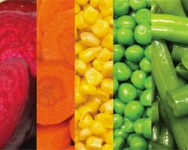2025 NYS Processing Vegetable Industry Meeting
Event Details
Date
March 11, 2025
Time
9:00 AM - 12:30 PM
Location
First United Methodist Church
8221 Lewiston Rd (Rt 63)
Batavia, NY 14020
Cost
FREE!
Host
Cornell Vegetable ProgramJulie Kikkert
585-313-8160
email Julie Kikkert

Processing vegetable industry members who grow, manage, or support crop production for Farm Fresh First/Nortera Foods, Seneca Foods and/or Love Beets, are encouraged to sign-up for the 2025 NYS Processing Vegetable Industry Meeting! 2.0 DEC recertification credits will be offered in categories 1a, 10, and 23 for those that stay the entire meeting (9:00 AM to 12:30 PM). 2.0 CCA credits available.
This meeting is sponsored by BASF, Bejo Seeds, Carolina Eastern - Crocker, Helena Agri-Enterprises, Nutrien Ag Solutions, Rovensa Next, Sakata Seed America, and Seedway.
AGENDA:
Registration and Sign-In for DEC and CCA Credits
Welcome -- Julie Kikkert, CCE Cornell Vegetable Program
Update from Cornell University -- Steve Reiners, Cornell
Processor Report on the 2024 Season -- Farm Fresh First and Seneca Foods
Report from the NYS Vegetable Research Association/Council -- Mike Gardinier, chair
Weed Control Research in Processing Vegetables -- Lynn Sosnoskie, Cornell
Towards a Durable Management Strategy for Foliar Diseases of Processing Carrots in NY -- Sarah Pethybridge, Cornell
Fungicide Update for Table Beets -- Sarah Pethybridge, Cornell
What's New from Industry? -- meeting sponsor updates
Stretch Break and Networking
Development of a Preparedness Strategy for Tar Spot of Processing Sweet Corn in NY -- Sarah Pethybridge, Cornell
Improving Management of Major Insect Pests of Sweet Corn and Snap Bean -- Brian Nault, Cornell
Survey on the Impacts of Slugs in Specialty Crops -- Sara Emery, Cornell
Processing Vegetable Variety Trials -- Michael Rosato and Steve Reiners, Cornell
Meeting Wrap Up and Evaluation -- Julie Kikkert, CCE Cornell Vegetable Program
Adjourn and Receive DEC Certificates
COST: It's free! (Please consider making a donation to our team to support our work in the region.)
REGISTRATION: Register now to reserve your spot!
SPONSORSHIPS: Industry sponsors are encouraged to sponsor this event! We'd appreciate your support!
For more information, contact Julie Kikkert.

Upcoming Events
Eden Area Winter Vegetable Meeting
February 4, 2026
North Collins, NY
Join us for a mix of industry updates, crop protection talks, pesticide safety programming, and fertility management discussions. This meeting is jointly hosted by the Cornell Vegetable Program and Timac Laing-Gro.
1.25 DEC credits available in CORE plus 1.75 in 1a and 23.
Orleans Regional Winter Vegetable Meeting
February 9, 2026
Albion, NY
Topics include: Breeding and evaluating tomatoes to control disease and improve yield, jar testing and ensuring spray water quality, breaking down organic matter, FSMA updates and Q&A with Ag & Markets, and industry updates. Includes hands-on learning, coffee break, and sponsor booths.
DEC credits available: 1.0 in CORE plus 0.5 in 1a, 10 or 23
African Eggplant Participatory Breeding Kick-Off
March 5, 2026
Join us to learn about the Cornell African Eggplant Research Project and learn how you can participate! African eggplant, also known as Bitterball, Garden Egg, Kittley and other names, is an important crop for many members of our community with heritage from regions such as sub-Saharan Africa, Southeast Asia, and Brazil. Since 2024, the Cornell African Eggplant Research Project has been collaborating with growers and community partners across New York to develop high-quality varieties adapted to the Northeast U.S. In this meeting, we will share information about growing and preparing African eggplant, highlight our research to date, and invite partners to collaborate with us in our 2026 participatory breeding and variety selection efforts.
COST: FREE! You must pre-register to receive the Zoom link.


































